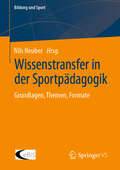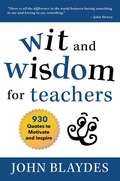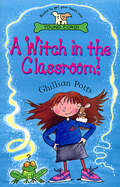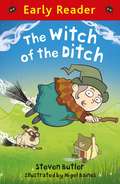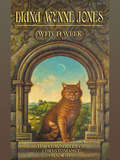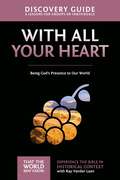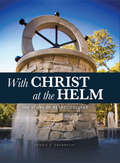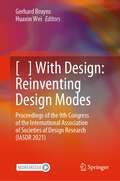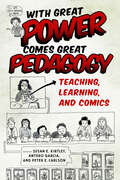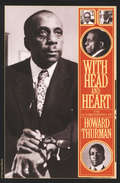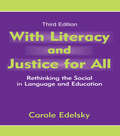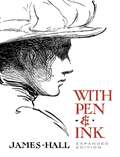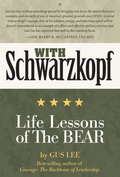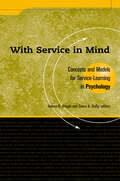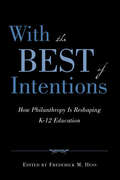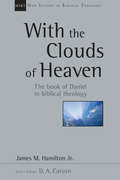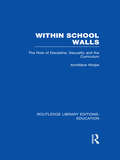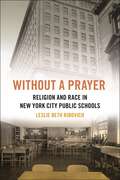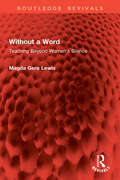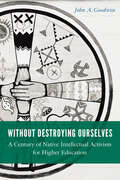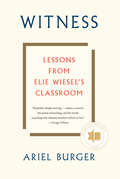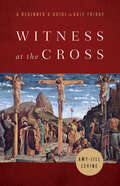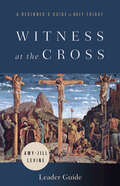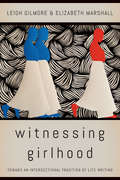- Table View
- List View
Wissenstransfer in der Sportpädagogik: Grundlagen, Themen, Formate (Bildung und Sport #34)
by Nils NeuberForschung und Lehre gelten gemeinhin als die zentralen Aufgaben von Universitäten. In den letzten Jahren kommt als „Third Mission“ der Transfer akademischen Wissens in die Praxis hinzu. Dafür mangelt es jedoch oft noch an Konzepten und Formaten. Das gilt auch für die Sportwissenschaft im Allgemeinen und die Sportpädagogik im Besonderen. Vor diesem Hintergrund werden mit dem Band Grundlagen, Themen und Formate sportpädagogischer Transferaktivitäten zusammengetragen und systematisiert.
Wit and Wisdom for Teachers: 930 Quotes to Motivate and Inspire
by John BlaydesNationally acclaimed speaker and educator John Blaydes complies nuggets of wit and wisdom to motivate and inspire his fellow educators. The Educator&’s Book of Quotes is a comprehensive resource for quotes relating to education and leadership, organized by sixteen themes for easy access and reference, including: The Art of TeachingBalancing the Time CrunchPrinciples and PrincipalsCreating a Culture of ExcellenceInspirational LeadershipEducation is KeyContaining hundreds of inspirational quotes for teachers in all stages of their career, The Educator&’s Book of Quotes is a must have.
A Witch In The Classroom!
by Ghillian Potts"You're a frog, Ryan James, you're a frog. Slimy and jumpy, bug-eyed and lumpy . . ."Abigail is thrilled when she discovers that she's a witch - at last she can get her own back on her bullying classmate, Ryan.With help from her pet rat, Gnasher, Abigain turns Ryan into a frog, but that's when disaster strikes - she can't change him back! And suddenly Abigail discovers that she's not the ONLY witch in the classroom . . .
The Witch of the Ditch (Early Reader)
by Steven ButlerA red Early Reader full of humour and fun, from bestselling author and actor, Steven Butler.Every town in the world has one witch - only one! So when the Hag of the Crag moves into town next door to the Witch of the Ditch, an all-out Witch War ensues.Early Readers are stepping stones from picture books to reading books. A blue Early Reader is perfect for sharing and reading together. A red Early Reader is the next step on your reading journey.
Witch Week
by Diana Wynne JonesThere are good witches and bad witches, but the law says that all witches must be burned at the stake. So when an anonymous note warns, "Someone in this class is a witch," the students in 6B are nervous -- especially the boy who's just discovered that he can cast spells and the girl who was named after the most famous witch of all.Witch Week features the debonair enchanter Chrestomanci, who also appears in Charmed Life, The Magicians of Caprona, and The Lives of Christopber Chant.Someone in the class is a witch. At least so the anonymous note says. Everyone is only too eager to prove it is someone else -- because in this society, witches are burned at the stake.
With All Your Heart Discovery Guide: Being God's Presence to Our World (That the World May Know)
by Ray Vander LaanFind out what it means to remember the Lord in your own life on this one-of-a-kind spiritual pilgrimage.In Exodus, God warned Israel to remember him when they left the dry desert and reached the fertile fields of the Promised Land. In this tenth volume of the series That The World May Know, you'll discover how quickly they forgot God and began to rely on themselves. You'll walk in their shoes through places like Timnah, Negev, and Jerusalem to gain a new understanding of the Bible that will ground your convictions and transform your life.This discovery guide includes passages of Scripture explored in the DVD (sold separately); questions for discussion and personal reflection; personal Bible studies to help you deepen your learning experience between sessions; as well as sidebars, maps, photos, and other study tools.Lessons include:Build Me a Sanctuary – Filmed in TimnahMaking Space for God – Filmed in TimnahHe Led Them Like a Shepherd – Filmed in NegevBy Every Word – Striking the Rock – Filmed in NegevWith All Your Might: The Final Test – Filmed in JerusalemA Well-Watered Garden – Filmed in JerusalemDesigned for use with the With All Your Heart Video Study (sold separately)._______________THAT THE WORLD MAY KNOWJoin renowned teacher and historian Ray Vander Laan as he guides you through the land of the Bible. In each lesson, Vander Laan illuminates the historical, geographical, and cultural context of the sacred Scriptures.Filmed on location in the Middle East and elsewhere, the That the World May Know film series will transform your understanding of God and challenge you to be a true follower of Jesus.
With Christ at the Helm: The Story of Bethel College
by Dennis EngbrechtThe past seven decades has witnessed an awakening in Christian higher education among American evangelicals. The story of Bethel College in northern Indiana is the embodiment of this reality. Birthed in 1947 by a denomination fraught with reservations and outright distrust of higher education, the college has survived a series of financial crises, experienced denominational realignment, endured the student unrest of the ‘60s and ‘70s, and suffered through an identity crisis in the ‘80s to eventually blossom into the fulfillment of its founders’ dreams by the late twentieth century. What emerges is the story of a college that epitomizes the very essence of its founding denomination: revivalism, a campus culture that encourages a strong sense of community, passionate evangelism, an unapologetic Christian worldview, and a deep commitment to the authority of Scripture. Coupled with a pursuit for academic excellence and the growth of vibrant co-curricular programming, the story of Bethel College is representative of evangelical colleges flourishing across the landscape of twentieth century American higher education.
[ ] With Design: Proceedings of the 9th Congress of the International Association of Societies of Design Research (IASDR 2021)
by Gerhard Bruyns Huaxin WeiThis collection stems from the International Association of Societies of Design Research (IASDR) congress in 2021, promoting the research of design in its many fields of application. Today's design finds itself at a critical moment where the conventional ‘modes’ of doing, thinking and application are increasingly challenged by the troubled ideology of globalisation, climate change, migration patterns and the rapid restructuring of locally driven manufacturing sectors. The volume presents a selection of papers on state-of-the-art design research work. As rapid technological development has been pushing and breaking new ground in society, the broad field of design is facing many unprecedented changes. In combination with the environmental, cultural, technological, and, crucially, pandemic transitions, design at large is called to fundamentally alter its modes of practice. Beyond the conventional models of conducting research, or developing solutions to ‘wicked’ problems, the recoupling of design with different modes should be seen as an expression to embrace other capacities of thinking, criticisms and productions. This selection of proceedings papers delivers the latest insights into design from a multitude of perspectives, as reflected in the eight thematic modes of the congress ; i.e., [social] , [making] , [business] , [critical], [historical/projective], [impact], [pandemic], and [alternative] with design modes. The book benefits design researchers from both academia and industry who are interested in the latest design research results, as well as in innovative design research methods. In presenting an interesting corpus of design case studies as well as studies of design impact, this comprehensive collection is of relevance to design theorists and students, as well as scholars in related fields seeking to understand how design plays a critical role in their respective domains.
With Great Power Comes Great Pedagogy: Teaching, Learning, and Comics
by Susan E. Kirtley, Antero Garcia and Peter E. CarlsonContributions by Bart Beaty, Jenny Blenk, Ben Bolling, Peter E. Carlson, Johnathan Flowers, Antero Garcia, Dale Jacobs, Ebony Flowers Kalir, James Kelley, Susan E. Kirtley, Frederik Byrn Køhlert, John A. Lent, Leah Misemer, Johnny Parker II, Nick Sousanis, Aimee Valentine, and Benjamin J. Villarreal More and more educators are using comics in the classroom. As such, this edited volume sets out the stakes, definitions, and exemplars of recent comics pedagogy, from K-12 contexts to higher education instruction to ongoing communities of scholars working outside of the academy. Building upon interdisciplinary approaches to teaching comics and teaching with comics, this book brings together diverse voices to share key theories and research on comics pedagogy. By gathering scholars, creators, and educators across various fields and in K-12 as well as university settings, editors Susan E. Kirtley, Antero Garcia, and Peter E. Carlson significantly expand scholarship. This valuable resource offers both critical pieces and engaging interviews with key comics professionals who reflect on their own teaching experience and on considerations of the benefits of creating comics in education. Included are interviews with acclaimed comics writers Lynda Barry, Brian Michael Bendis, Kelly Sue DeConnick, and David Walker, as well as essays spanning from studying the use of superhero comics in the classroom to the ways comics can enrich and empower young readers. The inclusion of creators, scholars, and teachers leads to perspectives that make this volume unlike any other currently available. These voices echo the diverse needs of the many stakeholders invested in using comics in education today.
With Head and Heart: The Autobiography of Howard Thurman
by Howard Thurman&“One of the great religious leaders of [the twentieth] century&” tells his story of growing up under segregation and finding his calling as a minister (Atlanta Journal-Constitution). Howard Thurman was a singular man—a minister, philosopher, and educator whose vitality and vision touched the lives of countless people of all races, faiths, and cultures. In his moving autobiography, Dr. Thurman tells of his lonely years growing up in a segregated town, where the nurturing black community and a profound interest in nature provided his deepest solace. That same young man would go on to become one of the great spiritual leaders of our time. Over the course of his extraordinary career, Thurman served as a dean of Rankin Chapel and professor of theology at Howard University; minister of the interdenominational Fellowship Church in San Francisco, of which he was a cofounder; dean of Marsh Chapel of Boston University; and honorary canon of the Cathedral Church of St. John the Divine in New York. He was deeply engaged in work with the Howard Thurman Educational Trust until his death in 1981. This is Thurman&’s story in his own inspiring words. &“Inspiring . . . a tale of trial and triumph. It should be read by everyone.&” —Vernon Jordan, president of the National Urban League &“Now we can peer with delight into the soul of this master and grasp some of the sense of religious genius which has been the source of all that blessed teaching.&” —Rabbi Joseph B. Glaser, former executive vice president, Central Conference of American Rabbis &“The reader&’s admiration for this educator and spiritual healer grows naturally as the story unfolds.&” —The Atlanta Journal-Constitution &“Thurman leads his readers . . . with an air of gracious ease and imperturbable dignity.&” —Kirkus Reviews
With Literacy and Justice for All: Rethinking the Social in Language and Education (Language, Culture, and Teaching Series)
by Carole EdelskyThe third edition of With Literacy and Justice for All: Rethinking the Social in Language and Education continues to document Carole Edelsky's long involvement with socially critical, holistic approaches to the everyday problems and possibilities facing teachers of language and literacy. This book helps education professionals understand the educational/societal situations they are dealing with, and literacy instruction and second language learning in particular contexts. Edelsky does not offer simplistic pedagogical formulas, but rather, progressively works through differences and tensions in the discourses and practices of sociolinguistics, bilingual education, whole language, and critical pedagogy--fields whose practitioners and advocates too often work in isolation from each other and, at times, at cross purposes. In this edition, what Edelsky means by rethinking is improving and extending her own views, while at the same time demonstrating that such rethinking always occurs in the light of history. The volume includes a completely new Introduction and two entirely new chapters: one on reconceptualizing literacy learning as second language learning, and another on taking a historical view of responses to standardized testing. Throughout, in updating the volume, Edelsky uses a variety of structural styles to note contrasts in her views across time and to make the distinction clear between the original material and the current additions. This edition is a rare example of a scholarly owning-up to changes in thinking, and a much needed demonstration of the historically grounded nature of knowledge. As a whole, the third edition emphasizes recursiveness and questioning within a deliberately political framework.
With Pen & Ink: Expanded Edition (Dover Art Instruction)
by James HallEducator and artist James Hall draws upon his extensive teaching experience to demonstrate how to develop a successful approach to the use of pen and ink. His two-part treatment addresses both decorative and pictorial drawing. Starting with outlines, composing, and the use of solids and hatching, Hall progresses to the renderings for more advanced practitioners of still lifes, architecture, and figures. A great companion for beginners, this volume can help develop a casual interest into a rewarding pastime. The clear, well-illustrated directions offer a "work at your own pace" method that builds in complexity with the reader's progress. This expanded edition updates the original publication's century-old materials list, reflecting the currently available products that best support these traditional skills. Also included are additional gallery samples, selected from the author's original list of exemplary sources, for guidance and inspiration to assist in learning from these timeless teachings.
With Schwarzkopf
by Gus LeeWith Schwarzkopf is Gus Lee's remembrance of his mentor and friend H. Norman Schwarzkopf, and his firsthand account of how Schwarzkopf shaped his life. In 1966, Lee, a junior-year cadet at West Point, was bright, athletic, and popular. He was also on the verge of getting kicked out. Nearing the bottom of his class due to his penchant for playing poker and reading recreationally instead of studying engineering, he was assigned a new professor: then-Major Norman Schwarzkopf. Schwarzkopf's deeply principled nature and fierce personality took hold of the wayward cadet, and the two began meeting regularly and discussing what it meant to be a scholar, a soldier, and a man. Lee's vibrant, witty narrative brings his more than forty-year relationship with Schwarzkopf to life. Readers get an inside look at West Point culture; they see Schwarzkopf's bristling anger with his rebellious pupil as well as his tenacity, intellect, and moments of surprising emotional warmth; and they watch as Lee starts to absorb his teachings. As he left West Point and took on more professional and personal roles, Lee approached every crisis or difficult decision by channeling his mentor. Over the years, Schwarzkopf's instilled values, wise counsel, and warm conversations shaped Lee and brought the two together in an unlikely friendship. In With Schwarzkopf, Lee passes along the lessons he learned so future generations can hear Schwarzkopf's important teachings.
With Service In Mind: Concepts and Models for Service-Learning in Psychology
by Robert G. Bringle Donna K. Duffy Edward ZlotkowskiThis volume, sixth in the Service-Learning in the Disciplines Series, reflects the growing interest among psychology educators in service-learning from the perspectives of research, practice, and teaching. The first part of the book addresses how psychological theory, research, and practice bear on collaborating with communities, while the second half shows how service-learning can be effectively integrated into a variety of psychology courses to increase the breadth and depth of student learning.
With the Best of Intentions: How Philanthropy Is Reshaping K-12 Education
by Frederick M. HessBringing together a mix of researchers and practitioners, With the Best of Intentions examines the major goals of recent philanthropic efforts and looks at some of the key lessons--for educators, philanthropists, policymakers, and community leaders--of philanthropic contributions to schools and school systems. From the Gates small school initiative to the Annenberg challenge to the Broad prize for urban education, philanthropic giving has played an increasingly prominent role in recent years in education reform efforts across the United States. Yet while we recognize that philanthropic organizations influence education in countless ways, we know strikingly little about the extent, dynamics, and results of their efforts. This lack of knowledge calls out for urgent attention of total K-12 spending, it has a disproportionate impact in shaping reform agendas and promoting cutting-edge efforts to improve schools and classrooms.With the Best of Intentions aims to fill this gap, offering lively perspectives on the role of philanthropy in K-12 education. It opens by surveying the current landscape in philanthropic giving to education, then examines the major goals of recent philanthropic efforts: building new schools, supporting troubled districts, promoting school choice, and advancing educational research and policy. The book concludes by looking at some of the major lessons--for educators, philanthropists, policymakers, and community leaders--of philanthropic contributions to schools and school systems. An informative and multifaceted volume, With the Best of Intentions is also full of debates and controversies. It will be of interest to scholars, policymakers, and education and community leaders--as well as to the philanthropic community itself.
With the Best of Intentions: How Philanthropy Is Reshaping K-12 Education
by Frederick M. HessBringing together a mix of researchers and practitioners, With the Best of Intentions examines the major goals of recent philanthropic efforts and looks at some of the key lessons--for educators, philanthropists, policymakers, and community leaders--of philanthropic contributions to schools and school systems. From the Gates small school initiative to the Annenberg challenge to the Broad prize for urban education, philanthropic giving has played an increasingly prominent role in recent years in education reform efforts across the United States. Yet while we recognize that philanthropic organizations influence education in countless ways, we know strikingly little about the extent, dynamics, and results of their efforts. This lack of knowledge calls out for urgent attention of total K-12 spending, it has a disproportionate impact in shaping reform agendas and promoting cutting-edge efforts to improve schools and classrooms.With the Best of Intentions aims to fill this gap, offering lively perspectives on the role of philanthropy in K-12 education. It opens by surveying the current landscape in philanthropic giving to education, then examines the major goals of recent philanthropic efforts: building new schools, supporting troubled districts, promoting school choice, and advancing educational research and policy. The book concludes by looking at some of the major lessons--for educators, philanthropists, policymakers, and community leaders--of philanthropic contributions to schools and school systems. An informative and multifaceted volume, With the Best of Intentions is also full of debates and controversies. It will be of interest to scholars, policymakers, and education and community leaders--as well as to the philanthropic community itself.
With the Clouds of Heaven: The Book of Daniel in Biblical Theology (New Studies in Biblical Theology #Volume 32)
by James M. Hamilton Jr."And behold, with the clouds of heaven there came one like a son of man, and he came to the Ancient of Days and was presented before him. And to him was given dominion and glory and a kingdom." (Daniel 7:13-14 ESV). Perceiving a hole in evangelical biblical theology that should be filled with a robust treatment of the book of Daniel, James Hamilton takes this chance to delve into the book's rich contribution to the Bible's unfolding redemptive-historical storyline. By setting Daniel in the broader context of biblical theology, this canonical study helps move us toward a clearer understanding of how we should live today in response to its message. First, Hamilton shows how the book's literary structure contributes to its meaning, and then addresses key questions and issues, concluding by examining typological patterns. This New Studies in Biblical Theology volume argues that the four kingdoms prophesied by Daniel are both historical and symbolic—that the "one like a son of man" seen by Daniel is identified with and distinguished from the Ancient of Days in a way that would be mysterious until Jesus came as both the son of David and God incarnate. He elaborates that the interpretations of Daniel in early Jewish literature attest to strategies similar to those employed by New Testament authors and exposes that those authors provide a Spirit-inspired interpretation of Daniel that was learned from Jesus. He also highlights how the book of Revelation uses Daniel's language, imitates his structure, points to the fulfillment of his prophecies and clarifies the meaning of his "seventieth week." Addressing key issues in biblical theology, the works comprising New Studies in Biblical Theology are creative attempts to help Christians better understand their Bibles. The NSBT series is edited by D. A. Carson, aiming to simultaneously instruct and to edify, to interact with current scholarship and to point the way ahead.
Within School Walls: The Role Of Discipline, Sexuality And The Curriculum (Routledge Library Editions: Education)
by AnnMarie WolpeDrawing from her in-depth ethnographic study of a London comprehensive school the author shows how gender formation for both girls and boys is mediated by disciplinary control, sexuality and the curriculum. Her findings for girls and boys – with their important emphases – are revealed. So are the responses and perspectives of the teachers. Prior to publication of this volume much feminist writing depicted the subordination of girls as a function of patriarchal control, both in terms of the teaching the girls receive and the behaviour of the boys around them. The author’s narrative implicitly and explicitly challenges some of these views.
Without a Prayer: Religion and Race in New York City Public Schools (North American Religions #24)
by Leslie Beth RibovichReframes religion’s role in twentieth-century American public educationThe processes of secularization and desegregation were among the two most radical transformations of the American public school system in all its history. Many regard the 1962 and 1963 US Supreme Court rulings against school prayer and Bible-reading as the end of religion in public schools. Likewise, the 1954 Brown v. Board of Education case is seen as the dawn of school racial equality. Yet, these two major twentieth-century American educational movements are often perceived as having no bearing on one another.Without a Prayer redefines secularization and desegregation as intrinsically linked. Using New York City as a window into a national story, the volume argues that these rulings failed to successfully remove religion from public schools, because it was worked into the foundation of the public education structure, especially how public schools treated race and moral formation. Moreover, even public schools that were not legally segregated nonetheless remained racially segregated in part because public schools rooted moral lessons in an invented tradition—Judeo-Christianity—and in whiteness.The book illuminates how both secularization and desegregation took the form of inculcating students into white Christian norms as part of their project of shaping them into citizens. Schools and religious and civic constituents worked together to promote programs such as juvenile delinquency prevention, moral and spiritual values curricula, and racial integration advocacy. At the same time, religiously and racially diverse community members drew on, resisted, and reimagined public school morality.Drawing on research from a number of archival repositories, newspaper and legal databases, and visual and material culture, Without a Prayer shows how religion and racial discrimination were woven into the very fabric of public schools, continuing to inform public education’s everyday practices even after the Supreme Court rulings.
Without a Word: Teaching Beyond Women's Silence (Routledge Revivals)
by Magda Gere LewisThe question of women’s silence within academic settings has received a great deal of attention. And much feminist educational scholarship has devoted itself to creating spaces where women’s stories and experiences can be told. Without a Word (first published in 1993) raises the question of women’s silence from a radical new perspective, lending at long last a theoretical basis and sophistication to this important issue.The author considers the subject of silence from a variety of conceptual and practical perspectives. When does silene occur among women? How does it emerge? What are its complex origins? What are its devastating effects? Lewis also discusses the different types of silence: the one which is an expression of a woman’s oppression and the one which is her act of revolt.Actual classroom interactions, student experiences, literary and filmic depictions of women, and her own personal voice are the material from which Lewis crafts her powerful theory. Intended to offer an understanding of the subject which can help feminists and teachers struggling to change the nature and dynamics of classroom experience for all students, Without a Word dramatizes the issue of silence in a way that moves beyond the mere need for women to speak and be heard. This book is a must read for students and researchers of education, feminist studies, women studies, and sociology.
Without Destroying Ourselves: A Century of Native Intellectual Activism for Higher Education (Indigenous Education)
by John A. GoodwinWithout Destroying Ourselves is an intellectual history of Native activism seeking greater access to and control of higher education in the twentieth century. John A. Goodwin traces themes of Henry Roe Cloud&’s (Ho-Chunk) vision for Native intellectual leadership and empowerment in the early 1900s to the later missions of tribal colleges and universities (TCUs) and education-based, self-determination movements of the 1960s onward. Vital to Cloud&’s work was the idea of how to build from Native identity and adapt without destroying that identity. As the central themes of the movement for Native control in higher education developed over the course of several decades, a variety of Native activists carried Cloud&’s vision forward. Goodwin explores how Elizabeth Bender Cloud (Ojibwe), D&’Arcy McNickle (Salish Kootenai), Jack Forbes (Powhatan-Renapé, Delaware Lenape), and others built on and contributed to this common thread of Native intellectual activism. Goodwin demonstrates that Native activism for self-determination was never snuffed out by the swing of the federal government&’s pendulum away from tribal governance and toward termination. Moreover, efforts for Native control in education remained a vital aspect of that activism. Without Destroying Ourselves documents this period through the full accreditation of TCUs in the late 1970s and reinforces TCUs&’ continuing relevance in confronting the unique needs and challenges of Native communities today.
Witness: Lessons from Elie Wiesel's Classroom
by Ariel BurgerWINNER OF THE NATIONAL JEWISH BOOK AWARD—BIOGRAPHY Elie Wiesel was a towering presence on the world stage—a Nobel laureate, activist, adviser to world leaders, and the author of more than forty books, including the Oprah’s Book Club selection Night. But when asked, Wiesel always said, “I am a teacher first.” In fact, he taught at Boston University for nearly four decades, and with this book, Ariel Burger—devoted protégé, apprentice, and friend—takes us into the sacred space of Wiesel’s classroom. There, Wiesel challenged his students to explore moral complexity and to resist the dangerous lure of absolutes. In bringing together never-before-recounted moments between Wiesel and his students, Witness serves as a moral education in and of itself—a primer on educating against indifference, on the urgency of memory and individual responsibility, and on the role of literature, music, and art in making the world a more compassionate place. Burger first met Wiesel at age fifteen; he became his student in his twenties, and his teaching assistant in his thirties. In this profoundly thought-provoking and inspiring book, Burger gives us a front-row seat to Wiesel’s remarkable exchanges in and out of the classroom, and chronicles the intimate conversations between these two men over the decades as Burger sought counsel on matters of intellect, spirituality, and faith, while navigating his own personal journey from boyhood to manhood, from student and assistant, to rabbi and, in time, teacher. “Listening to a witness makes you a witness,” said Wiesel. Ariel Burger’s book is an invitation to every reader to become Wiesel’s student, and witness.
Witness at the Cross: A Beginner's Guide to Holy Friday
by Prof. Amy-Jill LevinePlace yourself as a witness of the cross and determine what your own testimony will be! Experience Holy Friday from the perspective of those who watched Jesus die: Mary his mother; the Beloved Disciple from the Gospel of John; Mary Magdalene and the other women from Galilee; the two men, usually identified as thieves, crucified with Jesus; the centurion and the soldiers; Joseph of Arimathea and Nicodemus. Jews and Romans, friends and strangers, the powerful and the powerless, the hopeful and the despairing. The story of Jesus’s death is not something we just read: we think about it, and we experience it; we hear the taunts of the soldiers, the priests, and the passersby even as we hear the famous “seven last words” from the cross.In Witness at the Cross, Amy-Jill Levine shows how the people at the cross each have distinct roles to play. Each Evangelist presents a distinct picture of the death of Jesus. Each portrays different individuals and groups of people at the cross, each offers different images and dialogues, and so from each, we learn how those meanings and messages cross the centuries to any who would come to the cross today. Each Gospel has its own story to tell, all the witnesses have their own memories, and every reader comes away with a new insight. The witnesses at the Crucifixion watch Jesus die, and we watch with them, and we watch them. And we come away transformed. Additional components are available for a six-week study include a DVD featuring Dr. Levine and a comprehensive Leader Guide.
Witness at the Cross Leader Guide: A Beginner's Guide to Holy Friday
by Prof. Amy-Jill LevinePlace yourself as a witness of the cross and determine what your own testimony will be! Experience Holy Friday from the perspective of those who watched Jesus die: Mary his mother; the Beloved Disciple from the Gospel of John; Mary Magdalene and the other women from Galilee; the two men, usually identified as thieves, crucified with Jesus; the centurion and the soldiers; Joseph of Arimathea and Nicodemus. Jews and Romans, friends and strangers, the powerful and the powerless, the hopeful and the despairing. The story of Jesus’s death is not something we just read: we think about it, and we experience it; we hear the taunts of the soldiers, the priests, and the passersby even as we hear the famous “seven last words” from the cross.In Witness at the Cross, Amy-Jill Levine shows how the people at the cross each have distinct roles to play. Each Evangelist presents a distinct picture of the death of Jesus. Each portrays different individuals and groups of people at the cross, each offers different images and dialogues, and so from each, we learn how those meanings and messages cross the centuries to any who would come to the cross today. Each Gospel has its own story to tell, all the witnesses have their own memories, and every reader comes away with a new insight. The witnesses at the Crucifixion watch Jesus die, and we watch with them, and we watch them. And we come away transformed.The Leader Guide includes session outline for each group meeting with Scripture, prayer, opening activity, discussion questions, activity, and ending call to action.
Witnessing Girlhood: Toward an Intersectional Tradition of Life Writing
by Leigh Gilmore Elizabeth MarshallWhen more than 150 women testified in 2018 to the sexual abuse inflicted on them by Dr. Larry Nassar when they were young, competitive gymnasts, they exposed and transformed the conditions that shielded their violation, including the testimonial disadvantages that cluster at the site of gender, youth, and race. In Witnessing Girlhood, Leigh Gilmore and Elizabeth Marshall argue that they also joined a long tradition of autobiographical writing led by women of color in which adults use the figure and narrative of child witness to expose harm and seek justice. Witnessing Girlhood charts a history of how women use life narrative to transform conditions of suffering, silencing, and injustice into accounts that enjoin ethical response. Drawing on a deep and diverse archive of self-representational forms—slave narratives, testimonio, memoir, comics, and picture books—Gilmore and Marshall attend to how authors return to a narrative of traumatized and silenced girlhood and the figure of the child witness in order to offer public testimony. Emerging within these accounts are key scenes and figures that link a range of texts and forms from the mid–nineteenth century to the contemporary period. Gilmore and Marshall offer a genealogy of the reverberations across timelines, self-representational acts, and jurisdictions of the child witness in life writing. Reconstructing these historical and theoretical trajectories restores an intersectional testimonial history of writing by women of color about sexual and racist violence to the center of life writing and, in so doing, furthers our capacity to engage ethically with representations of vulnerability, childhood, and collective witness.
